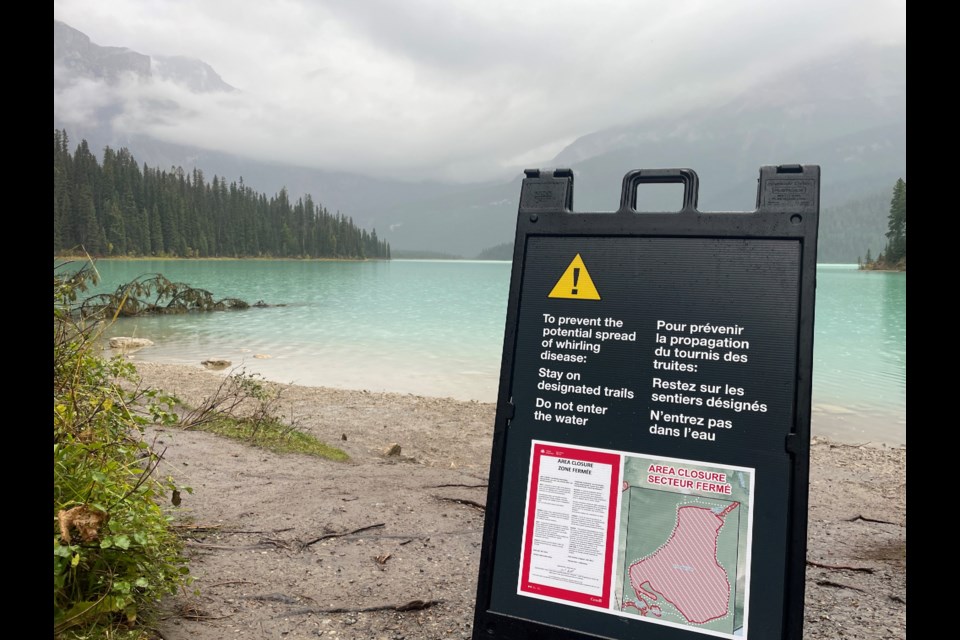YOHO – Parks Canada officials say “all options are on the table” to combat the recent discovery of deadly whirling disease in more waterbodies in Yoho and Kootenay national parks.
All waterbodies, except for frozen lakes, rivers and shorelines, were closed Thursday (Oct. 26) to human access until March 31, 2024, to prevent the spread of the disease known to wreak havoc on fish populations.
“We need to take some time to analyze. Right now, the focus is understanding the spread and taking protective actions, and then we’re going to start really thinking about how we can make sure that we have a regime next summer that is going to be working well,” said François Masse, Lake Louise, Yoho and Kootenay national parks superintendent at a media conference Friday (Oct. 27).
Parks Canada officials, after first detecting whirling disease in Yoho’s Emerald Lake in September, found other suspected cases of the disease in the Kicking Horse River, Wapta Lake, Finn Creek, Monarch Creek, and at the confluence of Emerald River and Kicking Horse River through further PCR testing.
To prevent the spread and protect the health of the national parks and aquatic ecosystems, the federal agency is restricting human activities while the risk of spread is lower in winter.
“Once the water has frozen and there’s very little activity in the parasite, and really little exposure to actual liquid water or the mud that contains the parasite, then the risk becomes incredibly low, which is why we’ll be permitting use on frozen waterbodies throughout the winter,” said Parks Canada spokesperson Megan Goudie.
“We’ll be taking this time to investigate management activities that will dictate what the spring will look like.”
Masse added with the risk of disease transmission being higher in spring and summer – linked to increased activity in the parasite responsible for whirling disease and watercraft use – closures may extend past March 31.
Parks is also considering killing off fish populations as one option to eradicate the disease.
In 2016, following the discovery of the deadly disease in Banff’s Johnson Lake, the waterbody was drained, and fish were killed to protect at-risk species like bull trout and westslope cutthroat trout.
“The disease is incredibly difficult to totally eradicate once it’s been spread in a watershed,” said Goudie. “At this time, we know there are suspected cases throughout the Upper Kicking Horse watershed in Yoho National Park.
“There have been instances where the management tool most effective to manage whirling disease spread in very localized waterbodies [is eradicating fish]. It is a management tool that we are considering.”
The agency said it’s too early to tell what the most effective management approach will be but is urging visitors to respect all closures and restricted activity orders.
“It’s incredibly difficult to fully eradicate whirling disease from a waterbody,” said Goudie. “But right now, we’re gathering all the information, we’re working closely with our partners and other jurisdictions and colleagues that have dealt with whirling disease in the past to determine what these next steps might be.”
Aquatic invasive species such as the parasite responsible for whirling disease “disrupt and irreversibly damage aquatic ecosystems,” said Masse, adding it has potential to “decimate fish populations with mortality rates up to 90 per cent, in some cases.”
The disease is named for the distinctive circular swimming patterns exhibited by infected fish. It can infect many fish species including bull trout, westslope cutthroat trout, rainbow trout, mountain whitefish, brown and brook trout.
As per closure notices for Yoho and Kootenay national parks, it is strictly prohibited to engage in any in-water and shoreline activities or to come within three meters of a river, creek, or lake.
Prohibited water activities include but are not limited to, fishing, swimming, diving, wading, and the use of any watercraft, such as boats, paddle boards, rafts, or other vessels. Shoreline activities that are forbidden include, but are not limited to, hiking, walking, or cycling.
Exceptions include crossing a lake or river using approved trails, bridges, and fords, collecting treatable water for drinking purposes, and crossing a frozen waterbody or shoreline.
Parks Canada said the use of rental canoes at Emerald Lake is permitted as there is low risk of spreading the parasite across waterbodies with rentals remaining at the lake.
“Once established, aquatic invasive species may never go away,” said Masse. “The public is asked to respect all closures to stop the spread of aquatic invasive species. We need your help.”
The Local Journalism Initiative is funded by the Government of Canada. The position covers Îyârhe (Stoney) Nakoda First Nation and Kananaskis Country.



